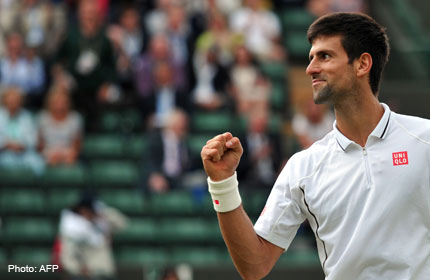
The sight of Andy Murray closing out the final point on Sunday, bringing down the curtain on 77 years of hurt, will remain the defining sporting image of 2013. But, for me, there is another image that will always give Murray a run for his money.
It was the sight of Novak Djokovic, the vanquished finalist, stepping up to give his post-match interview. It had been a torrid afternoon for the Serb, partly because of Murray's consistent brilliance, but partly also because he had to endure a crowd that was almost universally against him.
It would have been easy to be churlish or, at the very least, a tad unforthcoming. But no. The world No. 1 took the microphone and had the humanity to recognise the achievement of his opponent and the delight that it had given the crowd, and the nation.
"Congratulations to Andy," he said. "You absolutely deserve this win. You played incredible tennis. Congratulations to his team, I know how much it means to them, and how much it means to you guys, and the whole country. It was a pleasure to be a part of this final."
Thirteen days earlier, after an even more unexpected defeat, Rafael Nadal faced the massed ranks of the press. Some journalists would later describe his upset by world No. 135, Steve Darcis, of Belgium, as among the greatest in tennis history.
Nadal's discomfort on court had not been difficult to discern. He was moving gingerly, sometimes in obvious pain. He was not a million miles off the pace, but it was sufficient to give his opponent a chance, which he took with admirable composure.
Not surprisingly, the press wanted to talk about Nadal's injury. They wanted to know the extent of his pain and whether it might lead to an extended period out of the game, as happened this time last year. But Nadal was having none of it. He did not want a discussion of his injuries to detract from a life-changing victory for his opponent.
Again and again, he batted away volleys from the press. "It is not the right day (to talk about it)," he said. "I tried my best out there in every moment. The only thing that I can say today is to congratulate Steve Darcis. He played a fantastic match.

"Everything that I will say today about my knee is an excuse, and I don't like to put (forward) any excuse when I'm losing a match like I lost today. He deserves not one excuse."
Now, sport is an important part of life, it is often said. These invented worlds of bat and ball teach us how to compete, to strive and, ultimately, to win - as Murray showed last Sunday.
But there is another invaluable lesson that sport provides: It teaches us how to lose. It is about dealing with the bittersweet emotions of having tried one's hardest, but come up short.
This is important because it is defeat, and how we respond to it, that often defines us. It is about learning from defeat and refusing to allow it to destroy our motivation.
Above all, it is about having the maturity to congratulate an opponent who has seized a cherished prize from under one's nose.
There was a time when losing ungraciously was considered the hallmark of a champion. Coaches in sport (and in business) eulogised those who fumed when they lost and who took their frustrations out on the world.
In the early part of my sporting career, a coach actually congratulated a player who refused to shake hands with his opponent. "It showed how much he cared," he said.
It almost sounds plausible, doesn't it? The idea that it is in our discourtesy, our willingness to snub social convention, that we reveal our competitiveness.
But it is also bunkum. Do you suppose that Djokovic didn't want it on Sunday, as he lunged, leapt and chased down balls that had no right to be retrieved? Or that Nadal, that most muscular of battlers, lacks competitive will? Of course not.
The truth is that we can be ambitious, competitive and ruthless, while remaining courteous; that we can yearn to win while still honouring the rules.
This is also true in life. Civility is not, as is often thought, a surface aspect of modern society. Rather, it is a part of its very foundations. It is in the way we interact, respect each other, and deal with adversity that we add mortar to the building blocks of civilisation.
If that sounds highfalutin, I make no apology. Accepting defeat is not the same as defeatism; quite the reverse. Murray made that point when he said it was his defeat by Roger Federer last year that turned him into a champion. He learnt from adversity, rather than being consumed by it.
Murray was marvellous last Sunday. But Djokovic was marvellous too, as he provided the most profound lesson of all.
He showed us how to lose.

